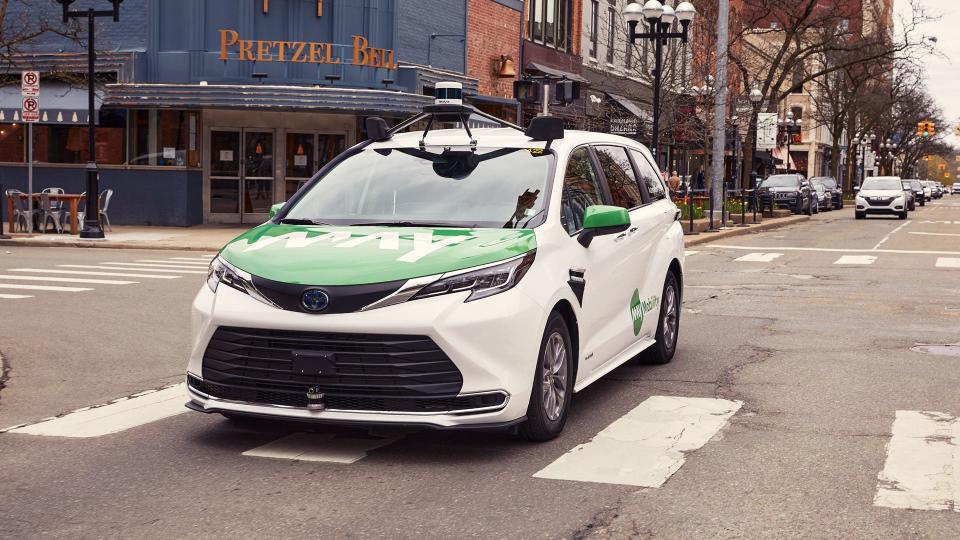Self-driving shuttles headed to Detroit; select residents will qualify for free rides
A number of Detroit’s older residents and those with disabilities who don’t qualify for paratransit services could have a chance beginning next year to use self-driving shuttles to get to medical appointments or other everyday destinations, even social outings.
It’s part of a pilot project funded through 2026 that should help fill a transportation gap at least temporarily for an underserved population and gather data for the future.

“We’re going to learn a lot through this process, and I think that Detroit has an opportunity to be a model city,” said Tim Slusser, the city’s chief of mobility innovation.
Detroit City Council OK’d a $2.4 million contract for the project with May Mobility, which is based in Ann Arbor, on July 25, but the project, which has a total cost of $14.8 million, is made possible through grant funding from the U.S. Transportation Department as well as the Knight and Delta Dental foundations. Detroit’s portion isn’t in cash, being described instead as an in-kind contribution. Research and community engagement began last year.
The project is led by the Michigan Mobility Collaborative, a public-private partnership, made up of entities including the city of Detroit, the American Center for Mobility, Mcity, the Michigan Department of Transportation and the University of Michigan Transportation Research Institute. Before being deployed in Detroit, the vehicles will go through testing at both the ACM and Mcity autonomous vehicle research sites.
The vehicles, modified hybrid electric Toyota Sienna minivans, will be self-driving, but they’ll also be staffed by a safety driver, someone who can intervene if needed or to provide assistance to passengers, which is how May Mobility operates its service in other locations.
“We have four seasons here in the city of Detroit,” Slusser explained during a City Council committee meeting last month. “We can’t have technologies that are struggling to navigate themselves around our city in the instance of snow or rain or other obstacles, so someone will 100% be behind the wheel at all times.”

Slusser, however, said that self-driving technology is capable, and he indicated that part of what the project will do will be to show it in action. He said the pilot project should offer a hint of what’s to come.
“The city of Detroit has led the automotive industry for the last 100 years in innovation and every way that matters,” Slusser told the Free Press. “The transportation system and … the mobility industry (are) rapidly changing and this is part of that change, where software and hardware are coming together to provide advanced solutions.”
More: Pay, scheduling causes widespread SMART, DDOT driver shortage, missed routes
The service will be by invitation-only — the organizers intend to start registering participants soon — and will be free for its users. It’ll operate in two zones, one around the main Henry Ford campus and the other east of downtown with the possibility of a connector corridor for the two zones. Those areas include 35% to 40% of households without cars and a high density of disabled residents younger than 65, according to information from Slusser’s presentation to the council committee.
Detroit is certainly not the only city struggling to provide robust transportation options to many of its residents, but the city and region have a well-documented history of falling short in that arena.
Details on the number of participants and specifics on hours have not been finalized, although the contract was structured to allow up to seven days of operation and 50 hours of service per week, according to the city.Participants could be picked up or dropped off at their homes, and Slusser said there’s a commitment that the project will create eight full-time jobs for Detroiters.
May Mobility has operated similar self-driving projects in other locations, including in partnership with AARP in Sun City, Arizona, but Daisy Wall, the company’s senior director of government business, clarified that it’s not a robotaxi, describing the shared ride service as similar to Uber although with a phone-scheduling option in addition to booking via smartphone app or a website.
May Mobility works with cities, public transit agencies and departments of transportation to determine the best scenarios to complement existing public transit services and fill gaps in those services, Wall said. In some locations, that might include providing service that connects the so-called first and last mile to and from a transit hub or stepping in where specific communities don’t offer frequent transit service.
Wall said May has seen a range of unmet demands for transportation services, from Sundays when people want to go to church but regular transit might not be running to one-car households where families must choose between getting the kids to school or the breadwinner to work on time.
The company does intend to remove the safety driver from its regular operations at some point in the future, but Wall said that individual might transition to a new role, perhaps as an attendant coaching patients headed to a medical center on how to reduce diabetes risk to someone providing language assistance for those learning English as a second language.
Contact Eric D. Lawrence: elawrence@freepress.com. Become a subscriber.
This article originally appeared on Detroit Free Press: Detroit self-driving shuttles to fill in transit gaps during pilot

